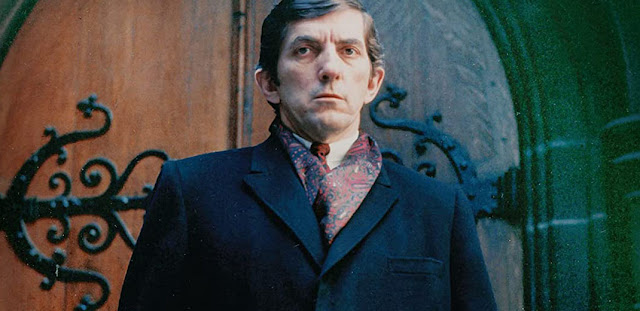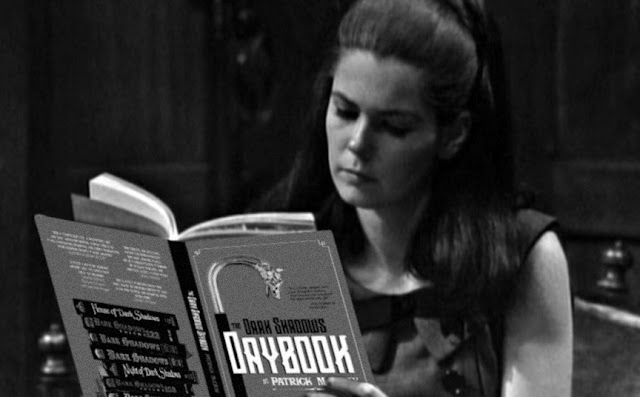There are times when an idea moves beyond the intention and becomes an unexpected wonder. Dark Shadows fans enjoyed just that in Richard Halpern and Ansel Faraj’s recent Zoom production of A Christmas Carol, which ‘aired’ on December 19. Not only did the producers bring us an adaptation of Orson Welles’ radio play, but David Henesy and Alexandra Moltke Isles returned to join the ensemble. You probably know that. You probably also know that their return should have been the story. If it had been limited to that, it would have been a successful moment in history, but a failure as a drama. And there is not one unsuccessful second in this production.
At its very marrow, this production of a Christmas Carol is the most artistically successful follow-up to Dark Shadows since the show went off the air. The budget was not vast. But that doesn’t matter. Did it ever? Because fans of the show don’t necessarily want more Dark Shadows from our Dark Shadows. We want more of the ensemble. And we want to see them given the chance to show us and the world why we love them. This was that opportunity. The script is a strong and economical distillation of the story, supporting the actors yet staying out of their way. I can’t necessarily say that for other Dark Shadows productions. And while it’s not a Dark Shadows production, it is, resoundingly.
As wacky and perfunctory as the project could have been, it manages, above all else, to be tasteful in its risks, with everyone participating. It’s improvised and compromised around the edges, and that lets us see what the actors bring to the execution via quirky and personal contributions. From wonky top hats, cozy scarves and appropriately fire engine-red reading glasses to David Selby‘s tieless tuxedo, the visual world of this show intersects immediacy and literacy and, most prized of all, fun.
I mean, there is an inherent ridiculousness to any production via zoom. It’s hard to bring James Tyrone to life if it looks like Peter Brady is about to appear in the square next-door to announce that his voice has changed. But that kind of visual language is used with discretion and strategy by Ansel Faraj. He trades out widescreen oomph for spectacle that works on a more resonant and emotional level. That becomes clear when Mitch Ryan delivers the touching and spare epilogue. His adoring cast members look on with professional satisfaction and affectionate gratitude for the chance to hear him have the final word. And it’s just as moving for us.
Of course, the impossible luck of seeing this ensemble assembled is going to put any audience of fans in the right mood. Yes. That’s especially true in a year where, I believe, we have lost more cast members than I’m comfortable counting. Everyone is both having fun and bringing their A-Game, with about as much prep time as we are used to seeing them have on the original show.
This was not an easy presentation to pull together with little notice. But its success is not a minor miracle. It’s what happens when determined professionals get to do what they do best. The result is a production that, although brief, connects us with the emotional realities of the actual text, serving up sobering truths about aging, regret, and envy with equal measures of believably-earned hope.
Of course, there is esprit de corps and an intense sense of teamwork. But at a certain point, someone has to be Scrooge and stand out even further.
So, David Selby.
In a performance that defines the most extraordinary horizons of what quarantine theater can be, Selby captures true theatrical size with the cerebral nuances afforded by the intimacy of the webcam. In the midst of nothing but technology, he rescues the humanity that the story deserves. It is an honest performance. I kept waiting for his “bah humbug,“ and other trademark phrases, eager to hear his unique spin on them. Well, there was no spin. Instead, I was seeing Ebenezer Scrooge making a point to other characters rather than a self-conscious actor trying to top earlier Ebenezers. David Selby is a fine writer who represents the author, not himself. I suspect that we are seeing the performance he would want from actors in one of his own productions.
As the story unfolds, we see a character desperate to hide the pain he associates with lost loves and friendships. This is ostensibly a play about the unfair privilege of class differences. Here, I sense a parallel story: the unfair privilege of relationship differences. Scrooge, having earned it, wears his alienation with the pride of a man sure of nothing else. Selby’s Scrooge feels wisely reverse-engineered from the middle of the play outward in either direction. The relatable sadness of his miscalculations and deviations from the Fezziwig standard chain him as much as the weights encumbering Jacob Marley. As a character haunted by Marley‘s Christmastime passing long before any literal ghosts appear, Selby takes great care to believably connect with the details of Ebenezer’s past. With nothing but his face and voice, he brings us the depth of Dickens with a rare purity as Scrooge is reintroduced to everything he’s lost.
When Scrooge finally exults in, perhaps, the most heartfelt “Merry Christmas“ I may have ever heard, I felt like I was seeing a man finally given permission to forgive himself. Scrooge connects with a world ever ready to offer second chances, and if anything makes this a “Dark Shadows“ production, it’s that. Again and again, that’s the message of the program, and that’s the message that we see here, as well.
Partly because of our connection with the work of these actors over decades, the result is emotionally exhausting, but never overwrought. Honesty may not always be pretty, but if it is explored with range and sympathy, it is inevitably the most satisfying part of a ritual like this.
Back to context. Rarely, if ever, does a franchise give its loyal audience a gift of this much heart and finesse. I don’t know if we will see the ensemble assembled like this once more. I think everyone is aware of that danger. Like the story itself, this was an opportunity to express a simple truth — moments to express respect, admiration, and love may never come again. Don’t be stingy with them.
James Storm is once again the reliable chameleon, embodying principled strength with compassionate eloquence. Jerry Lacy conjures up a Marley with precisely the grim relish to catalyze the journey. David Henesy has lost none of his ability to nail every single line with impudent sincerity. Nancy Barrett completely erases any sadness I might have at her absence from acting by reassuring me that her spark and wit are still screen-ready for the producer smart enough to cast her. And more effervescent than ever, Marie Wallace brings her native warmth and sense of life with every bit of the immediacy we enjoyed in 1968 and 1969.
Yes, the story is a bit of a boy’s club… which is a clear invitation to the dance for such a powerful female ensemble. Nonetheless, Lara Parker elicits the nimble delicacy of the language with naturally cerebral verve. Kathryn Leigh Scott mixes a sense of ethical sincerity with the hint of sardonic mischief that is her laudable trademark. Leave it to accomplished authors to know exactly how to handle poetry of mirth and strength.
And the former Miss Winters? Alexandra Moltke Isles could have coasted on her own novelty, but she doesn’t. There is a dark and intense forthrightness to her presence, and I am too busy watching her character to be distracted by the rare and long awaited return of their actor. She wanted to explore more range and darker colors on the tv program. It took 50 years to see why she was right, but the results are well worth it.
Finally, Mitch Ryan inaugurates and resolves the story with an easy, reserved gravitas of reassuring authority. It takes the brightest of actors to observe the action with an improbably passionate neutrality. Mitch Ryan was and is the definition of that bright actor.
When the Dark Shadows Universe (a thing extending far beyond the actual production of the show) initially said goodbye to Ryan, Moltke Isles, and Henesy, a critical balance was lost. Thanks to this production, this can now be seen as only momentary. Dark Shadows is about home, often for those without one. Watching this made me feel as if the doors to Collinwood were open again. 2020 and 2021 took more from us than we deserved. This gesture, at this time, is an essential reminder of what we still have. Too often, the love of a franchise reveals itself in the desperate acquisition of props and autographs and photos and handshakes, all of which are noble, but all of which distract us from the real reasons why we love the people who brought it to life. Richard Halpern and Ansel Faraj take full advantage of this rare opportunity to see them doing what we love most: acting. They have not only given this ensemble yet another vehicle to relish telling a great story together, but they have given us the opportunity and intimacy to see it.




























